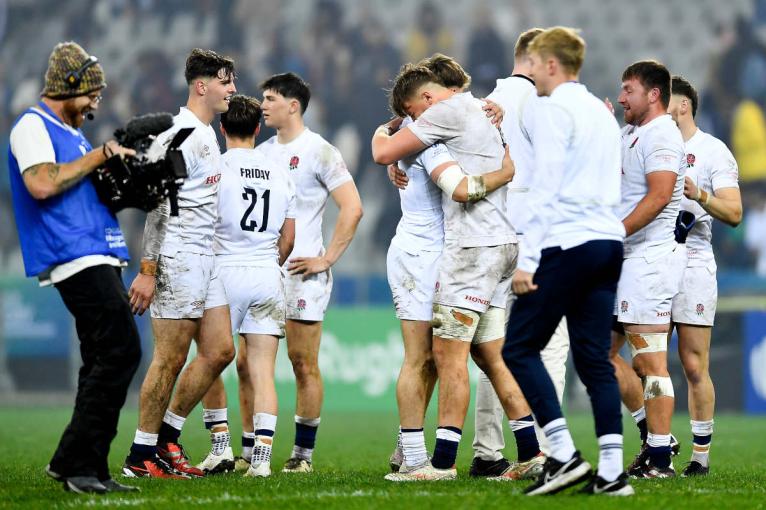Steve Borthwick must be wondering if he has been bequeathed a golden generation. England’s class of ‘24 are clearly an exceptional bunch having become under-20s world champions. That sort of thing doesn’t happen often to English teams. It is eight years since they last lifted the trophy.
So at one end of the sausage machine is some high-grade raw materials but whether the senior team will benefit will depend on what comes out the other end.
The equipment isn’t always the most reliable in English rugby.
The England coach’s hope must be that the Premiership will serve as a hothouse for talents like Asher Opoku-Fordjour and Henry Pollock. Both have already tasted league rugby at Sale and Northampton and, fingers crossed, they will be given more opportunities next season.
But there are divergent forces at play which make it difficult to assess the direction of travel for the Premiership as a fast-track finishing school.

In terms of pure numbers the terrain has become tougher. The reduction from 13 to ten clubs has squeezed the amount of places available for young players.
On the flip side the player exodus towards higher-paying leagues abroad, especially at the top end, will free up space in some positions.
Borthwick could do with a helping hand from the league’s DORs in taking a risk or two on youth but as he knows all too well, whatever good intentions they have when it comes to player development, their bottom line is always results.
The easy selection is often the ready-made one.
Loan moves to Championship clubs offer an alternative avenue that at least makes sure the players are on the pitch but the gap in quality between tier one and tier two is significant.
It is the Premiership where they should be learning their trade.
While some players will push through, for others in that under-20s side the harsh reality is that they have already experienced their career peak. Some will fall by the wayside – in a contact sport like rugby injury is an occupational hazard.
Next season clubs will have to field a minimum of 15 English-qualified players. There is an argument for legislating that three of those should be under-21s.
Perhaps it is too dictatorial a solution but there needs to be some incentive – be it carrot or stick – otherwise the danger is too much of this talent could wither on the vine.
The period where junior rugby abruptly turns into senior rugby carries with it the biggest danger of stagnation and worse.
For a player who has sailed through age group rugby, suddenly finding themselves at the back of the queue can feel like hitting a brick wall. Being the best, or one of the best, is all they have ever known.
While some players will push through, for others in that under-20s side the harsh reality is that they have already experienced their career peak. Some will fall by the wayside – in a contact sport like rugby injury is an occupational hazard.
They scored some absolute crackers! 🌹🙌
Click below to watch every try from our England U20 men’s triumphant World Rugby U20 Championship campaign now 👇
— England Rugby (@EnglandRugby) July 24, 2024
Some may leave the sport for other reasons. Harry Mallinder, the stand-off for the 2016 under-20s side, joined the NFL’s International Player Pathway as a punter earlier this year. Andrew Kitchener, the bench second row, is now a data analyst predicting electricity consumption after being made redundant when Worcester collapsed.
Of those who do make it to the top of the tree, some will have other choices to make.
Dual qualification means other nations will inevitably come knocking.
From the 2016 squad, Johnny Williams went on to play for Wales and Matt Gallagher is now part of Italy’s squad.
Of the current England under-20s crop full-back Ioan Jones and flanker Kane James both qualify for Wales while 6ft 8in second row Junior Kpoku could end up representing France – where his brothers also play – through residency if he stays at Racing 92.
Of the current England under-20s crop full-back Ioan Jones and flanker Kane James both qualify for Wales while 6ft 8in second row Junior Kpoku could end up representing France – where his brothers also play – through residency if he stays at Racing 92.
Kpoku would not be allowed to play for England in any case while he is based in Paris because of the RFU’s overseas selection ban for the senior team.
He would be one player Borthwick might have his eye on. But how many world-beating tight-five forwards are there at the age of 22 or 23? Not many.
The physical leap into men’s rugby is a challenge and the adjustment takes time – a commodity international head coaches aren’t overly blessed with.
If we assume Borthwick is going to be a two-term president then that gives this group three years to mature in time for the World Cup in 2027. That is not long, particularly for the pack that was the driving force behind the Under-20s’ triumph.

In fact, scroll back to the last time England won the under-20s World Cup in 2016 and it is striking how few of that side in any position – backs or forwards – were involved in the senior World Cup in Japan three years later. Only one in fact, third-choice hooker Jack Singleton, and he was on the field for just 11 minutes during the tournament.
So, certainly in terms of Australia ‘27, it is far from simply being a case of joining the dots from Cape Town to Sydney. While it is right for English rugby to feel good about itself on the back of the triumph in South Africa, there needs to be a reality pill swallowed too. As a marker for the next World Cup it is likely to be pretty much irrelevant.
It is in the longer term – moving towards the 2031 World Cup – that England could cash in.
Other England internationals did emerge in time from that 2016 age group side. Will Stuart, Harry Randall, Max Malins and Jack Willis all went on to play for the seniors post-2019. Joe Marchant, who had made his debut in the World Cup warm-up games but missed out on the squad, came through too.
It is probably not going to be of much use to Borthwick but USA ‘31 is likely to be where the big picture is painted.
That is if the fates behave and the English domestic game can manage to nurture its young stars properly.


“It is probably not going to be of much use to Borthwick but USA ‘31 is likely to be where the big picture is painted.”
I actually disagree with this. The position where England are weakest at senior level (tighthead) is the position where they are strongest at u20. I’d be shocked if one of Opoku-Fordjour or Sela don’t get picked for 2027, and there’s an outside chance that they both get picked, possibly with Fasogbon thrown in for good measure.
I also think Kpoku will have much more opportunities at international rugby in England than in France. He’s not going to get selected above Meafou or Tuilagi, and he might not be mobile enough to make it as a loosehead lock. England however are blessed with Itoje, Chessum, and Martin, but don't really have any solid backups to those three, so would probably love the opportunity to select a young guy like Kpoku for bench minutes.